Big Five 100 – Video of the international conference celebrating the 100th anniversary of the birth of five legendary mathematicians
The Department of Mathematical Sciences of the Hungarian Academy of Sciences (MTA) organised an international conference to mark the 100th anniversary of the birth of the mathematicians Lipót Fejér called the “Big Five”. At the ceremony, held at the HUN-REN Alfréd Rényi Institute of Mathematics, László Fuchs, who celebrates his 100th birthday this year, was personally welcomed and received the János Arany Lifetime Achievement Award, the most prestigious academic honour for Hungarian scientists abroad, from the President of the Academy. A recording of the event, partly in Hungarian, is available in our article.
First part of the conference recording (from 28:58 in English)
Second part of the conference recording
János Aczél, Ákos Császár, László Fuchs, István Gál (Gaál) and János Horváth were born in 1924. Their teacher, the legendary Lipót Fejér, called them the “Big Five” while they were still at university.
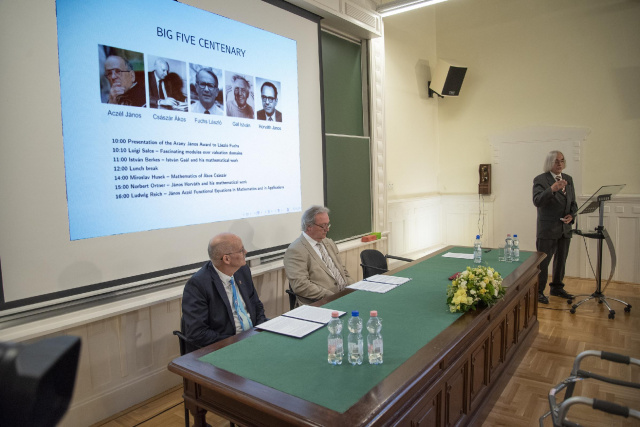 Péter Pál Pálfy, President of the János Bolyai Mathematical Society, opens the Big Five Centenary. At the table are Tamás Freund, President of MTA, and Zsolt Páles, President of the Department of Mathematical Sciences of MTA. In the background, on the projector, are members of the Big Five and the conference programme.
Péter Pál Pálfy, President of the János Bolyai Mathematical Society, opens the Big Five Centenary. At the table are Tamás Freund, President of MTA, and Zsolt Páles, President of the Department of Mathematical Sciences of MTA. In the background, on the projector, are members of the Big Five and the conference programme.Photo: mta.hu / Tamás Szigeti
They indeed became the great rebooters of Hungarian mathematics after the Second World War, who in just a few years brought Hungarian mathematics back to the international level again and cultivated it to be at the forefront of world mathematics for a lifetime. In fact, Fuchs is still doing mathematics today:
the scientific activity of the world-famous mathematician, who celebrates his 100th birthday this year, has been continuous for more than three quarters of a century.
The jubilee celebration and international conference in honour of the scientific work of the members of the “Big Five,” held at the HUN-REN Alfréd Rényi Institute of Mathematics on 5 June 2024, was opened by Pálfy, full member of the Hungarian Academy of Sciences and President of the János Bolyai Mathematical Society, followed by Páles, President of the Department of Mathematical Sciences of the Hungarian Academy of Sciences, who welcomed Fuchs.
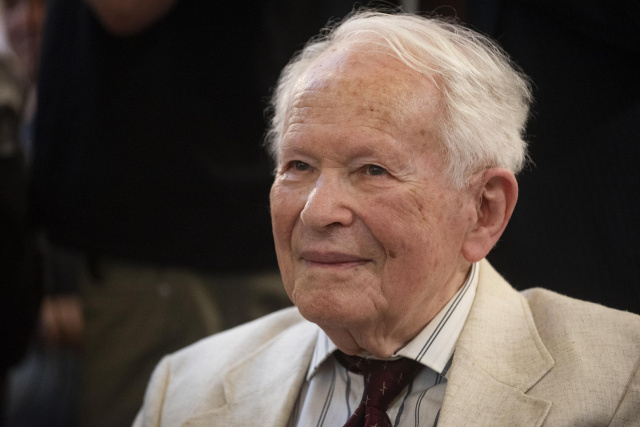 László Fuchs at the a Bige Five Centenary Photo: mta.hu / Tamás Szigeti
László Fuchs at the a Bige Five Centenary Photo: mta.hu / Tamás SzigetiPáles, quoting a recollection of Fuchs published in Hungarian Science, said that the legendary meetings of the “Big Five” were different from ordinary seminar lectures, not only in that the members were constantly interjecting questions and ideas, but also in that they laughed and joked almost non-stop, where the subject of the joke was usually the topic being discussed or the way it was presented.
“It was wonderful to learn some serious maths alongside all the jokes,”
said Páles, quoting Fuchs, who then recalled the scientific conference held in 2004 in honour of the members of the Big Five entitled “400 Years of Mathematics”, at which all members of the legendary society were present and gave a lecture, and the 90th anniversary conference held in 2014, at which Aczél and Fuchs, the remaining members still alive at the time, were able to attend in person.
Closing his speech, Páles said:
“The impact of the members of the Big Five is almost immeasurable. And it is no exaggeration to say that there is no mathematician in Hungary today who has not read László Fuchs’ textbook Introduction to Algebra. But János Aczél’s books on functional equations and Ákos Császár’s on topology have also become bibles in their fields of study.”
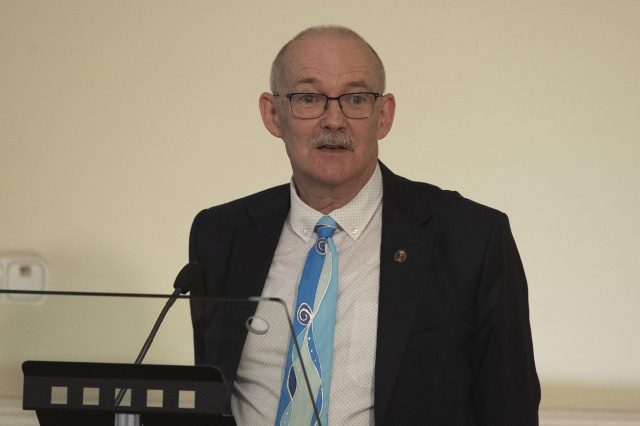 Zsolt Páles, President of the Department of Mathematical Sciences of the Hungarian Academy of Sciences, gives a toast at the Big Five Centenary
Zsolt Páles, President of the Department of Mathematical Sciences of the Hungarian Academy of Sciences, gives a toast at the Big Five CentenaryPhoto: mta.hu / Tamás Szigeti
Páles was followed by the President of the Hungarian Academy of Sciences, who greeted the celebrant and presented him with
the Academy’s most prestigious award for Hungarian scientists abroad, the János Arany Lifetime Achievement Award,
which honours Hungarian scientists who, as members of the Hungarian community beyond the borders, have demonstrated significant scientific achievements throughout their lives.
In his speech welcoming Fuchs, who is celebrating his 100th birthday in the month of his receiving the award, Tamás Freund first quoted the Dutch mathematician Dirk Jan Struik:
“Mathematicians live long: mathematics is a healthy profession.”
Freund then quoted famous mathematicians Bertrand Russel and Henri Poincaré, with their thoughts on mathematics. “In his essay “Study of Mathematics”, Bertrand Russell wrote of the subject: ‘Mathematics, if rightly understood, is not only a matter of truth, but also of sublime beauty: cold and austere, like sculpture (...) sublimely pure, and capable of the rigorous perfection which only the greatest art can show.’ And Henri Poincaré said: ‘Mathematics is a language in which it is not possible to express vague or imprecise ideas.’ So what is it that makes mathematicians live long?”
asked the Academy President.
“Perhaps it is precisely this passionate search for purity, perfection and order. Their love. From his four articles in English at the beginning of his career in 1947 to his two publications last year and his work in progress, László Fuchs exemplifies and represents this.
And he represented this and the “Big Five” represented this, even when they had to do so in the shadow of history,” continued Freund. “The weight that history places on us is mostly not our personal choice,” said the Academy President. “This is not our decision. It comes from the outside. But what we do in the situation we find ourselves in, how we deal with our situation, is primarily in our hands. We can decide on the quality of our work, on our inner freedom and loyalty to our profession. László Fuchs and the members of the “Big Five” made this decision during their university years.
Their devotion to mathematics has accompanied them throughout their lives, and their work has been a gift to international and Hungarian science.”
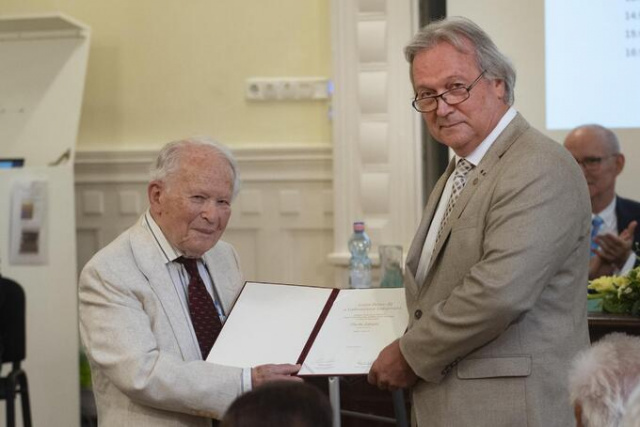 László Fuchs receives the János Arany Lifetime Achievement Award from Tamás Freund
László Fuchs receives the János Arany Lifetime Achievement Award from Tamás Freund Photo: mta.hu / Tamás Szigeti
After receiving the award, Fuchs gave a speech in which he began his overview of his career by remembering his parents: “Before I say a few words about my career, I cannot fail to recall with deep gratitude the memory of my parents. My mother succeeded in transplanting a fraction of the latent mathematical talent she inherited from her father. My father, a leading Finno-Ugric linguist,
set an example (even in the absence of state recognition) of the sacrifice and selflessness of research and the importance of investigating fundamental scientific questions. His influence on my life is immeasurably greater than that of anyone else,”
said Fuchs.
He went on to recall, “I became seriously interested in mathematics at the age of fourteen (...) I was not accepted to the University of Technology because of the numerus clausus, but after six months of working in a factory I was allowed to enrol in the Faculty of Humanities as a teacher candidate majoring in mathematics and physics. In 1945, immediately after the war, it was not possible to study much mathematics at the University of Pest. Professor Fejér grew weak during the German occupation. Professor Kerékjártó could no longer hold lectures due to his illness. The wartime suffering caused by military service, the terrible prisoner of war situation and inhuman labour did not break us.
We decided to study serious mathematics together. Five of us, all born in 1924.”
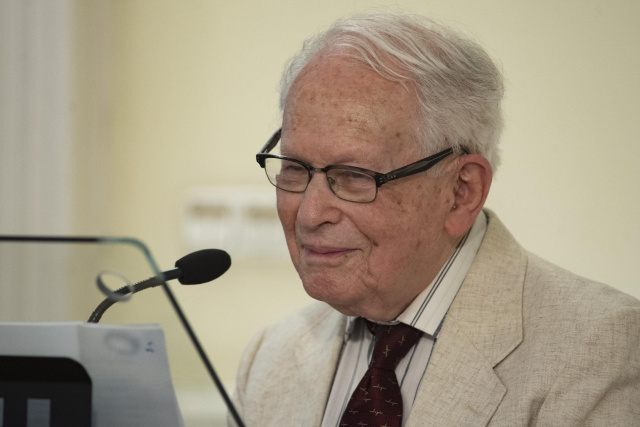
Fuchs delivers a speech of thanks and recalls his career at the János Arany Lifetime Achievement Award reception
Photo: mta.hu / Tamás Szigeti
Looking back over his mathematical career, Fuchs explained how his path led him from primal ideals theory, through the theory of ordered algebraic structures, to the study of Abelian groups and unsolved problems.
“This has remained my favourite subject all my life; I have written three books on Abelian groups,”
he continued. “Perhaps I made a mistake by changing my research problems frequently, but I confess I couldn’t resist trying to solve an interesting problem that arose. I was eighty years old when I retired, but there was no way I could stop doing mathematics. During the last twenty years I have written about many old problems and clarified many interesting questions in a new field for me, the new branch of commutative rings.
I am happy to say that I have managed to prove an important existential theorem. The theorem: mathematics still exists after ninety years.
This is not a new theorem, but we can agree that it is not easy to prove. It is a common practice to make promises of future work at the occasion of recognition. At my age, this makes no sense. But I can safely say that
my award confirms my ambition to prove that mathematics still exists after a hundred years.”
Following Fuchs’ speech, Imre Kacskovics, Dean of the Faculty of Science at ELTE, presented the celebrated mathematician with the platinum diploma of ELTE’s Faculty of Science “in recognition of an outstanding life’s work” and also in memory of László Fuchs’ service as Dean of the Faculty of Mathematics, Physics and Chemistry at ELTE between 1954 and 1956.
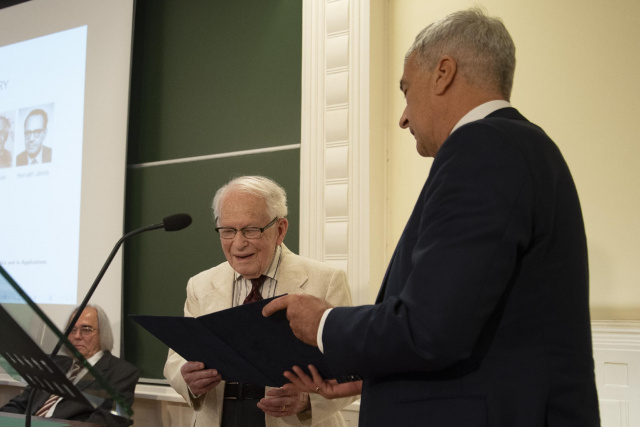
László Fuchs receives the ELTE platinum diploma from Dean Imre Kacskovics
Photo: mta.hu / Tamás Szigeti
The celebratory speeches in Hungarian were followed by an international conference in English with five presentations by eminent mathematicians: Luigi Salce’s (University of Padua) “Fascinating Modules over Valuation Domains”, István Berkes’ (Alfréd Rényi Institute of Mathematics) “István Gál’s Mathematical Work”, Miroslav Hušek’s (Charles University, Prague) “The Mathematics of Ákos Császár”, Norbert Ortner’s (University of Innsbruck) “János Horváth, Born July 30th, 1924, in Budapest” and Ludwig Reich’s (University of Graz) “János Aczél – Functional Equations in Mathematics and in Applications”
were all in tribute to the work of each member of the “Big Five”, the five world-famous Hungarian mathematicians.
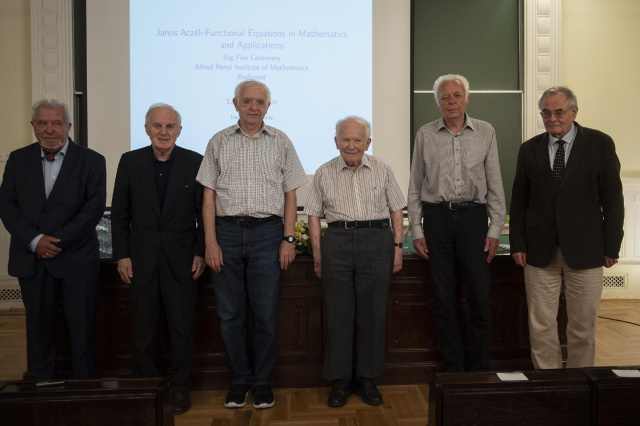
László Fuchs and the Big Five Centenary Lecturers (from left to right: Ludwig Reich, Luigi Salce, István Berkes, László Fuchs, Miroslav Hušek and Norbert Ortner)
Photo: mta.hu / Tamás Szigeti
